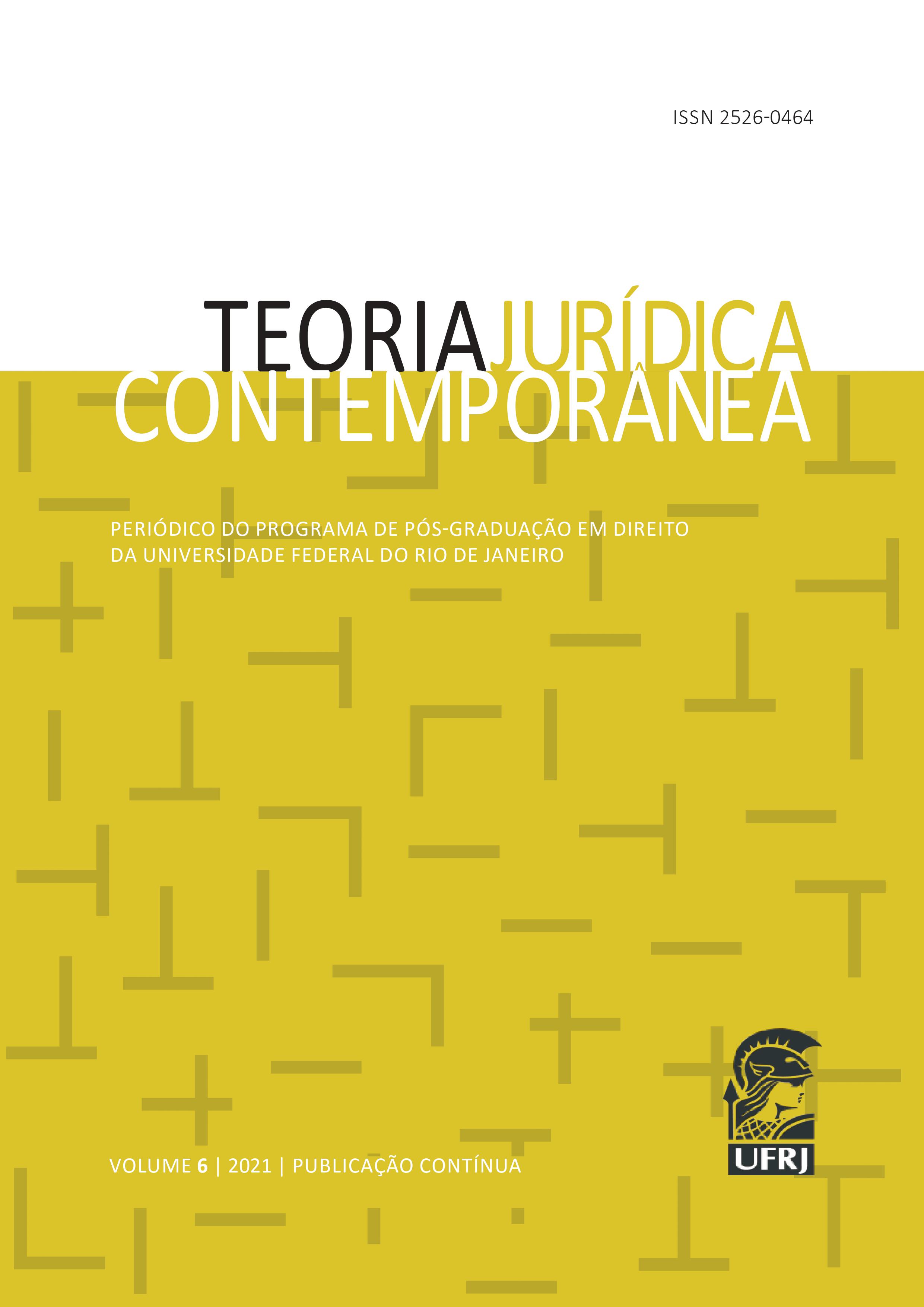DA PERSONALIDADE ELETRÔNICA À CLASSIFICAÇÃO DE RISCOS NA INTELIGÊNCIA ARTIFICIAL (IA)
DOI:
https://doi.org/10.21875/tjc.v6i0.44818Palabras clave:
Personalidade eletrônica, pessoa jurídica, Inteligência ArtificialResumen
O presente artigo procura investigar a temática da criação de uma personalidade jurídica (eletrônica) para agentes autônomos de inteligência artificial, abordando as limitações desse tipo de iniciativa através da análise do instituto da pessoa jurídica. Para tanto, apresentadas as principais características desse tipo de tecnologia que justificariam a proposta de personificação, bem como os atributos necessários para o seu enquadramento na proposta. Busca-se, por fim, confrontar a personalidade eletrônica com a nova proposta europeia de regulamentação da Inteligência Artificial.
Citas
BERTOLINI, Andrea. Robots as products: the case for a realistic analysis of robotic applications and liability rules. Law, Innovation and Technology, v. 5, n. 2, 2013, p. 214-247.
BRYSON, Joanna J.; DIAMANTIS, Mihailis E.; GRANT, Thomas D. Of, for, and by the people: the legal lacuna of synthetic persons. Artificial Intelligence Law, n. 25, 2017, p. 237- 291.
CALO, Ryan. Robotics and the lessons of cyberlaw. California Law Review, v. 103, n. 3, 2015, p. 513-563.
CHOPRA, Samir; LAWRENCE, White. A Legal Theory for Artificial Autonomous Agents. Ann Arbor: University of Michigan Press, 2011.
DARLING, Kate. Extending Legal Rights to Social Robots. We Robot Conference, Miami, 2012, p. 1- 18. Disponível em: http://robots.law.miami.edu/wp-content/uploads/2012/04/Darling_Extending-Legal-Rights-to-Social-Robots-v2.pdf. Acesso em: 06 jun. 2021.
EDWARDS, Lilian; VEALE, Michael. Slave to the Algorithm? Why a ‘right to an explanation’ is probably not the remedy you are looking for. Duke Law & Technology Review, v. 16, n. 01, 2016, p. 18-84. Disponível em: https://ssrn.com/abstract=2972855. Acesso em: 05 jun. 2021.
GALGANO, Francesco. Lex Mercatoria. Bologna: Il Mulino, 2001.
GALGANO, Francesco. Il costo della persona giuridica. Rivista delle società, v.13, n. 2, 1968, p. 1-16.
KURZWEIL, Ray. The Singularity is Near: When humans transcend biology. Nova York: Penguin Books, 2005.
LOPES, Giovana. Inteligência Artificial: Considerações sobre personalidade, agência e responsabilidade civil, 1 Ed. São Paulo: Editora Dialética, 2021.
MATTHIAS, Andreas. The responsibility gap: ascribing responsibility for the actions of learning automata. Ethics and Information Technology, v. 6, n. 3, 2004, p. 175-183.
MITTELSTADT, Brent; FLORIDI, Luciano; ALLO, Patrick; TADDEO, Mariarosaria; WACHTER, Sandra. The ethics of algorithms: Mapping the debate. Big Data & Society, v. 3(2), 2016, p. 1-21.
MODRALL, Jay. EU proposes new Artificial Intelligence Regulation. Inside Tech Law, April 22, 2021. Disponível em: https://www.insidetechlaw.com/blog/eu-to-propose-new-artificial-intelligence-regulation. Acesso em: 17 jun. 2021.
NEGNEVITSKY, Michael. Artificial Intelligence: A guide to intelligent systems, 2 Ed. Harlow: Addison-Wesley, 2004.
NEGRI, Sérgio. Robôs como pessoas: a personalidade eletrônica na Robótica e na inteligência artificial. Pensar, v. 25, n. 3, 2020, p. 1-14.
NEGRI, Sergio Marcos Carvalho de Ávila. As razões da pessoa jurídica e a expropriação da subjetividade. Civilistica, v. 5, n. 2, 2016, p. 1-18.
PEARL, Judea; MACKENZIE, Dana. The Book of Why: The new science of cause and effect. New York: Basic Books, 1. Ed., 2018.
POOLE, David; MACKWORTH, Alan. Artificial Intelligence: Foundations of Computational Agents. Cambridge: Cambridge University Press, 2010.
RICHARDS, Neil M.; SMART, William D. How should the law think about robots? In: CALO, Ryan; FROOMKIN, A. Michael; KERR, Ian (orgs.) Robot Law. Cheltenham: Edward Elgar Publishing, 2016.
RODOTÀ, Stefano. A antropologia do homo dignus. Trad. Maria Celina Bodin de Moraes. Civilistica, v. 6, n. 2, 2017, p. 1-17. Disponível em: http://civilistica.com/aantropologia-do-homo-dignus/. Acesso em: 10 jun. 2021.
RODOTÀ, Stefano. La vita e le regole: Tra diritto e non diritto. Milano: Fetrinelli Editore, 2007.
RUSSELL, Stuart J.; NORVIG, Peter. Artificial Intelligence: A Modern Approach. 3. ed. New Jersey: Prentice-Hall, 2010.
SAMUEL, Arthur. L. Some Studies in Machine Learning Using the Game of Checkers. IBM Journal of Research and Development, v. 3, n. 3, 1959, p. 210-229.
TURNER, Jacob. Robot Rules: Regulating Artificial Intelligence. Nova York: Palgrave Macmillan, 2019.
UNIÃO EUROPEIA. Communication from the Commission to the European Parliament, the European Council, the Council, the European Economic and Social Committee and the Committee of the Regions: Artificial Intelligence for Europe (COM/2018/237). Bruxelas: Comissão Europeia, 2018. Disponível em: Communication Artificial Intelligence for Europe | Shaping Europe’s digital future (europa.eu). Acesso em: 06 jun. 2021.
UNIÃO EUROPEIA. Proposal for a Regulation of the European Parliament and the Council Laying Down Harmonized Rules on Artificial Intelligence (Artificial Intelligence Act) and Amending Certain Union Legislative Acts (COM/2021/206). Bruxelas: Comissão Europeia, 2021. Disponível em: https://eur-lex.europa.eu/legal-content/EN/TXT/?qid=1623335154975&uri=CELEX%3A52021PC0206. Acesso em: 10 jun. 2021.
VLADECK, David C. Machines Without Principles: Liability Rules and Artificial Intelligence. Washington Law Review, v. 89, n. 01, 2014, p. 117-150.
Descargas
Publicado
Número
Sección
Licencia
Los autores que publican en esta revista están de acuerdo con las siguientes condiciones:
- Los autores mantienen los derechos de autor y conceden a la revista el derecho de primera publicación, estando el trabajo simultáneamente bajo la Licencia de Atribución de Creative Commons que permite compartir el trabajo con el reconocimiento de la autoría y la publicación inicial en esta revista.
- Los autores pueden asumir contratos adicionales por separado, para la distribución no exclusiva de la versión del trabajo publicada en esta revista (por ejemplo, publicando en un repositorio institucional o como capítulo de un libro), con el reconocimiento de la autoría y la publicación inicial en esta revista.
- Se permite y se anima a los autores a publicar y distribuir su trabajo en línea (por ejemplo, en repositorios institucionales o como página personal) en cualquier momento antes o durante el proceso editorial, ya que esto puede generar cambios productivos, así como aumentar el impacto y la citación del trabajo publicado (Véase El efecto del acceso abierto).

Esta obra está bajo una licencia de Creative Commons Attribution-ShareAlike 3.0 Brasil.

